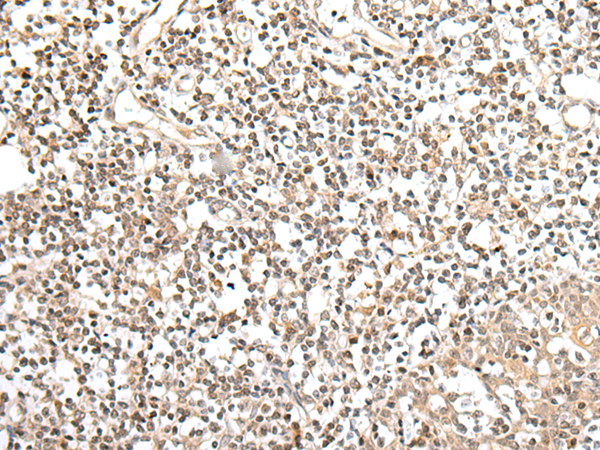

| WB | 咨询技术 | Human,Mouse,Rat |
| IF | 咨询技术 | Human,Mouse,Rat |
| IHC | 1/20-1/100 | Human,Mouse,Rat |
| ICC | 技术咨询 | Human,Mouse,Rat |
| FCM | 咨询技术 | Human,Mouse,Rat |
| Elisa | 1/5000-1/10000 | Human,Mouse,Rat |
| Aliases | AT591; CMT1D; CMT4E; KROX20 |
| WB Predicted band size | 50 kDa |
| Host/Isotype | Rabbit IgG |
| Antibody Type | Primary antibody |
| Storage | Store at 4°C short term. Aliquot and store at -20°C long term. Avoid freeze/thaw cycles. |
| Species Reactivity | Human, Mouse, Rat |
| Immunogen | Synthetic peptide of human EGR2 |
| Formulation | Purified antibody in PBS with 0.05% sodium azide and 50% glycerol. |
+ +
以下是3篇涉及EGR2抗体的代表性文献及其摘要概括:
---
1. **文献名称**: *Early growth response 2 (EGR2) is a key regulator of the peripheral myelination program*
**作者**: Le N, Nagarajan R, Yu J.
**摘要**: 本研究利用EGR2特异性抗体进行染色质免疫沉淀测序(ChIP-seq),揭示EGR2转录因子在施旺细胞中直接调控髓鞘相关基因(如MPZ和PMP22)的结合位点,证实EGR2抗体在解析周围神经髓鞘形成分子机制中的关键作用。
---
2. **文献名称**: *EGR2 mutations in inherited neuropathies: mechanisms of disease and therapeutic implications*
**作者**: Svaren J, Meijer D.
**摘要**: 通过免疫组织化学和Western blot分析携带EGR2突患者的神经组织,发现EGR2抗体可检测突变蛋白的异常表达及定位,揭示EGR2功能缺陷导致遗传性周围神经病变(如CMT1D)的分子病理机制。
---
3. **文献名称**: *EGR2 expression in autoimmune T cells: a potential biomarker for rheumatoid arthritis*
**作者**: Li Y, Wang Q, Zhang H.
**摘要**: 研究采用EGR2抗体通过流式细胞术检测类风湿性关节炎患者外周血T细胞,发现EGR2高表达与Th17细胞异常活化相关,提示EGR2抗体在疾病诊断和免疫调节机制研究中的潜在应用价值。
---
如需更多文献细节,可进一步检索PubMed或Google Scholar,关键词为“EGR2 antibody”或结合具体研究领域(如“neuropathy”、“autoimmunity”)。
The EGR2 (Early Growth Response 2) antibody is a tool used to detect and study the EGR2 protein, a transcription factor belonging to the early growth response (EGR) family. EGR2 plays critical roles in cellular differentiation, myelination of peripheral nerves, and immune regulation. It contains a zinc-finger DNA-binding domain, enabling it to regulate target genes by binding to specific promoter regions. Mutations in the *EGR2* gene are linked to inherited neuropathies such as Charcot-Marie-Tooth disease (CMT) and Dejerine-Sottas syndrome, highlighting its importance in peripheral nerve development. In immunology, EGR2 is expressed in T cells, where it modulates tolerance and suppresses excessive immune responses, implicating it in autoimmune disorders like systemic lupus erythematosus (SLE).
Antibodies against EGR2 are widely used in research to investigate its expression, localization, and function via techniques like Western blotting, immunohistochemistry, and flow cytometry. They help identify dysregulated EGR2 in disease models, offering insights into pathogenesis or therapeutic targets. Commercial EGR2 antibodies are typically validated for specificity in human, mouse, or rat samples. Researchers also explore its role in cancer, as EGR2 may act as a tumor suppressor or promoter depending on context. Overall, EGR2 antibodies serve as essential reagents in neuroscience, immunology, and oncology studies, bridging molecular mechanisms with clinical applications.
×